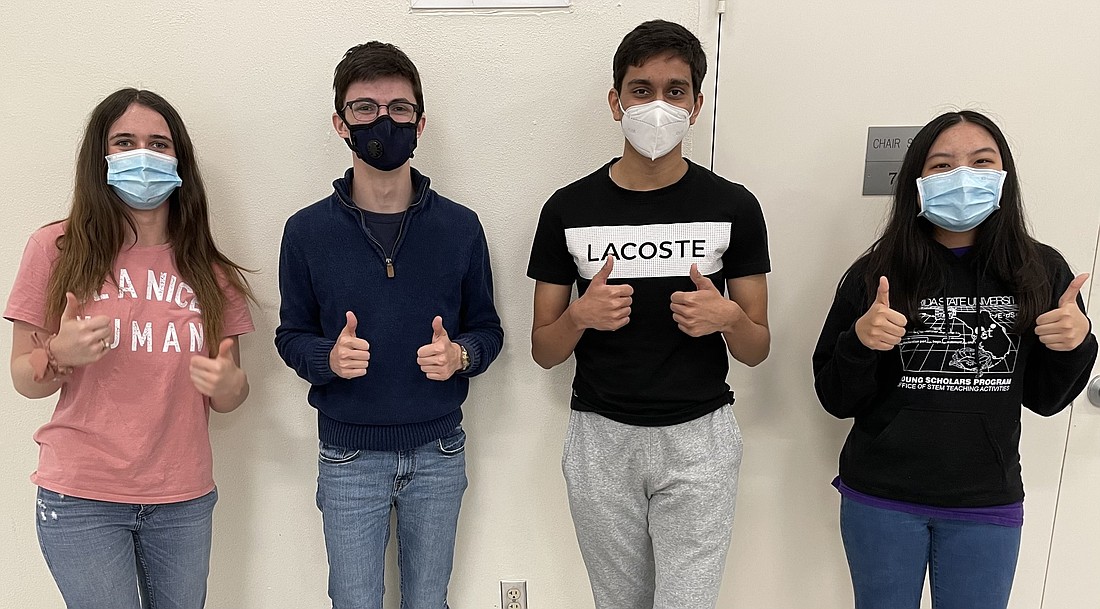- January 2, 2025
-
-
Loading

Loading

Once again, students from Pine View School finished ahead of most students their age in mathematics.
A team of five students ended up in the top 10 teams nationwide in the MathWorks Math Modeling Challenge, which challenges students to use math modeling to solve a global issue.
Each year, Pine View teacher Mark Mattia creates two teams of five students each to compete.
“We’re taking the students that are highly intrinsically motivated,” Mattia said. “If they’re doing this, it’s not for the scholarships that they can receive. It’s because they’re interested in it. This is what they do.”
The team of Uday Goyat, Grace Jiang, Maxim Kasyanenko, Julia Kourelakos and Danny McDonald, advanced to the finals of the event, which included 535 teams from the U.S. and U.K.
Using mathematical modeling techniques, students had 14 consecutive hours to create a solution to this year’s problem: defeating the digital divide to make internet accessible to everyone.
M3 Challenge director and lead problem developer Karen Bliss said the topic was chosen because of its relevancy.
“While this has been a problem for years, the pandemic has highlighted the reality of the digital divide,” Bliss said. “Those who don’t have fast, reliable internet are at a significant disadvantage when it comes to access to education and the ability to work from home, among other things.”
Within the time frame, the students created a mathematical model to predict what internet connectivity would cost over the next decade, how minimum bandwidth should be determined and the best way to distribute cellular nodes to maximize access.
“We all had some sort of base knowledge because it’s very topical in today’s society, but none of us were that knowledgable on the minutiae of the topic, so we had our work cut out for us,” Kourelakos said.
Once they had their model created, students were required to submit a paper detailing their work. They could update and resubmit their papers, typically 20 pages in length complete with bibliographies and visualizations, as many times as they wanted until the 14 hours were up.
Working for 14 hours straight is no small task, so the team prepared for about three months.
First, Mattia helped the team run through examples and build possible mathematical models. Then he started assigning mock trials where the students have one hour to finish, then five and so on until they reach 14 hours.
Although Mattia can critique their work when they’re finished with their trials, he does not help them during because he’s not allowed to be in the same room as them during the competition.
The students tend to divide the work into roles based on strengths, so those who are stronger at research or coding will focus heavily on those portions while others works on writing.
“Competition day is very exciting,” Kourelakos said. “It’s a long day, and it’s typically a topic that none of us know all that much about, so we really have to put our heads together, pool our knowledge on the subject and work together.”
After placing in the top 10 after the first two rounds of assessment, the teammates underwent a final round of judging April 26 when they virtually presented their findings to a panel of professional mathematicians. They were awarded third place in the technical computing section.
Students received $1,000 in scholarships. Although Kourelakos said it’s nice to have the scholarships, she’s proud to gain the experience and come out on top.
“It’s so exciting because we’re not a team that has fancy coaching or come from a background where we’ve been groomed in math for years,” Kourelakos said. “We’re willing to put in the work, and it’s exciting to know that the combined strength of our team can compete with some of the best in the country.”